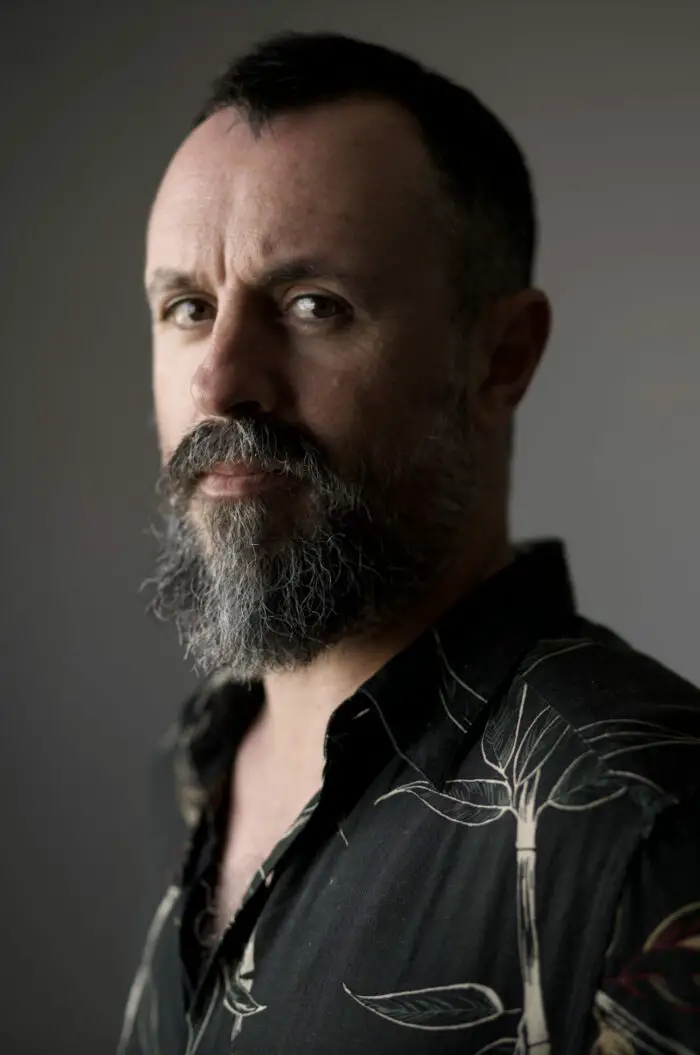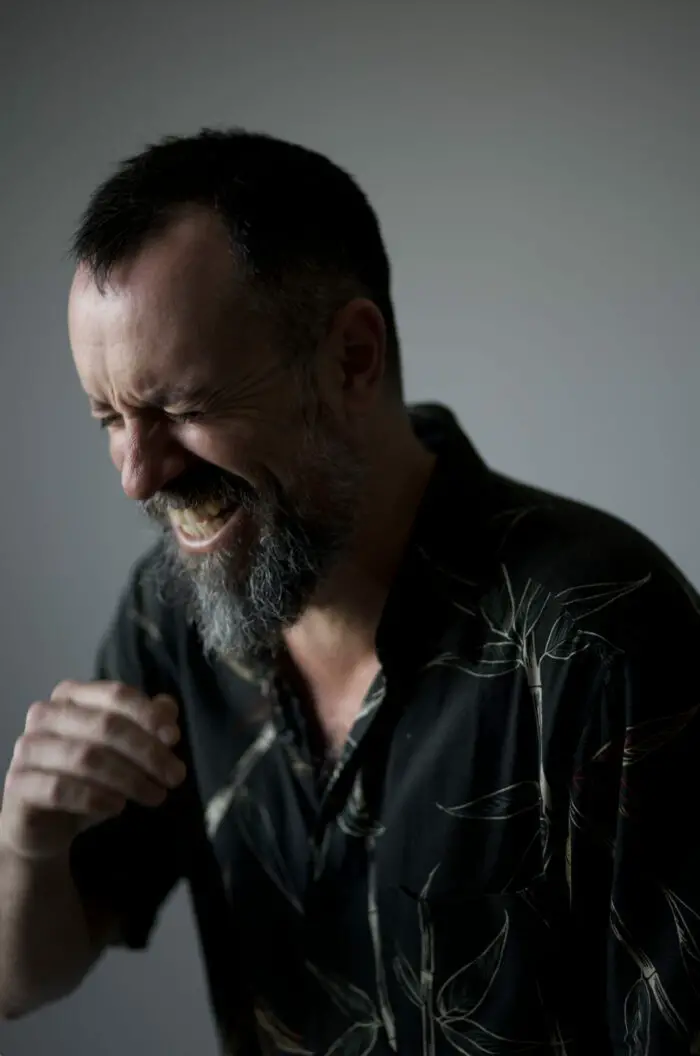I was offered the opportunity to review The Coffee Table (La Mesita Del Comedor) when its UK premiere was held at Grimmfest earlier this month. Having tracked down the man behind it, director and co-writer (with Cristina Borobia) Caye Casas, with some clumsy enthusiasm on Twitter, however, I was very glad he accepted my request for an interview: the film stunned me to a degree that I wasn’t sure I could find suitable words of my own, so this gave me the excuse to use his instead.
A table may be an innocuous object, but anything at all can be a catalyst for a pivotal incident. Add to that catastrophe the fragility of an unequal relationship, and we have a story that appears to be a domestic drama at first, but then heads into the territory of black comedy; probably the blackest I’ve seen. As Caye put it to me, “It is a different terror, the terror of life, of a cruel destiny, the cruelest thing you can imagine.”
Caye speaks only Spanish and Catalan, so Zoom was not going to be a viable platform this time. What follows here are my questions sent by email, along with his answers.

The cast were terrific, suitably expressive, without being melodramatic. How did you go about that selection process?
I love working with actors, and it is something I put a lot of effort and passion into. First I choose the actors I want, who I see clearly for the role, that’s key. The other important thing is to rehearse with them. This is a film shot in just ten days, but we rehearsed for a week in the apartment where the film takes place. As if it were a play, the actors know their characters better and how the story will be shot. That is always my method, choose well and rehearse a lot, there is no more secret.
How dark and unpleasant do you think comedy can get before it ceases to be funny?
I love black humor, all my shorts and my first film Killing God have black humor. In The Coffee Table, I wanted to take the maximum risks, putting extremely dark humor in the middle of the tragedy. People in the cinema don’t know whether to laugh or shut up, because they are so shocked that they don’t understand such contrasting emotions. I like to play that, a risky game, but this movie becomes a festival of strong emotions. The public is traumatized but they also laugh sometimes even if they don’t want to. It is black humor taken to its maximum exponent.

You’ve partnered with Albert Pintó previously; what prompted you to step into solo authorship?
Life, with Pintó we filmed my stories, I created and wrote them and we both directed them, now I continue making my low-cost independent film stories but without it. And he has been lucky enough to enter the big industry very strongly. Cinema united us and cinema separated us, life.
I won’t deny the film’s quality, but you can’t get away from the fact that The Coffee Table has a profoundly horrible and sad incident at its core: why should people be encouraged to see it, in your opinion?
It’s easy, I encourage people not to watch it, seriously. But if you like very strong emotions, authentic terror without artifice, if you are looking for a film that you can never forget and that takes you to a state of mind and nerves like you have rarely experienced in the cinema, The Coffee Table is your film. If not, take Barbie for example.
I was impressed with the way I was compelled to keep watching, even when I doubted that I wanted to. How did you go about maintaining that grip on the viewer?
I read a lot of what you say in viewers who have seen my film. People want to leave but they stay (some leave in the 20th minute), they want to know how this madness will end. I wanted that, I wanted to hit the viewer hard and make them suffer for the rest of the movie, just like the main character. Only the audience and the character of Jesús [played by David Pareja] know what has happened, and that unites them in that pain and that horrible tension. You keep watching that cruel story because you are feeling many things while watching The Coffee Table, you are not going to sleep with this movie, nor are you going to forget it. You are going to feel many things, you are going to suffer, you are going to sweat and maybe laugh. The important thing for me is to make people have an unforgettable experience. Whoever sees my film will never forget that they saw it, nor will they forget its plot. That’s very good for me, I’m tired of movies that don’t make me feel anything and I forget about them in three days. I get bored, and with my film, I don’t think they will get bored.

I have to ask: where did the story come from? Did you decide to make a film as shocking as possible without violence?
I really like genre cinema, but it surprises me very little, and it doesn’t scare me, I see things that are constantly repeated. Horror movies scare me little, I can watch a horror movie and eat popcorn at the same time. Then I asked myself…What scares me the most? And the answer was life, how cruel fate can be in real life. There is nothing more terrifying than the misfortunes that can happen to us, death is not the worst, cruel fate is the worst. I know of cases of lives that have become true infinite nightmares. In The Coffee Table, there are no ghosts, no monsters, no murderers, just a small table and a very cruel destiny. That’s why I made the movie.
Believe it or not, I was able to relate to Jesús situation: I once had something I couldn’t face telling my (now ex-) husband until there was simply no choice, and The Coffee Table served to put that experience into perspective. I wonder is there a message or a lesson you want audiences to take away from the film? About honesty perhaps, or unbalanced relationships?
At the sensational TIFF festival in Romania, something very curious and surprising happened to me. In the last question of the Q&A, in a theater with 1000 people, a woman told me that something similar to what happens in the movie had happened to her, almost exactly the same. Her reaction was to congratulate me for daring to tell those types of tragedies that no one dares to tell, and she told me that despite suffering a lot, he was leaving the cinema with inner peace. With this, I mean that we can all identify with my story, first because it can happen to all of us that life hits you hard. And then for the reactions that each one can have when something unexpected happens. It’s fun to see how people react to my cruel story, but everyone understands that they can experience or have experienced similar things. No one is safe from destiny.
A wide release for The Coffee Table is not yet confirmed, but if you (are sure you) want to see it on the big screen, it will be featured at Soho Horror Fest 2023 in London at the end of November.


